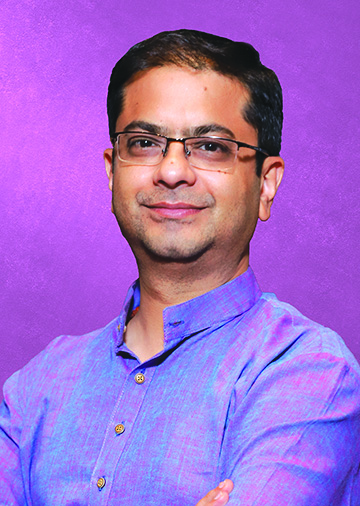
Shobhith Mathur
– Shobith Mathur, alum of IIT Bombay, Washington University, Indian School of Business and former technology manager at Amazon (USA). Shobith Mathur is cofounder and Vice Chancellor of Rishihood University, Sonipat
The challenge isn’t to celebrate past achievements but to actively work towards a future where the Indian mind is truly free. The times are changing and it’s logical that the education system is reinvented
On August 15, 1947, India unfurled its tricolour for the first time as a free nation. Seventy six years on, as we commemorate our nation’s independent journey, it’s essential to contemplate not only our territorial freedom but also the freedom of our minds. The challenge isn’t merely to celebrate past achievements, but to work actively towards a future where the Indian mind is truly free. In the words of Nobel laureate Rabindranath Tagore: “Where the mind is without fear and the head is held high, where knowledge is free.” And where better to begin than with our institutions of higher education.
The times are changing and it is only logical that the education ecosystem is reinvented so it can empower our youth to take on the world with appropriate skills and valid professional knowledge. The world is moving rapidly towards digitalisation with Artificial Intelligence, Metaverse and Internet of Things (IoT) taking over every sphere. And India with its great talent pool can never remain far behind.
Today, Indians are holding top positions around the world in all fields including science, technology, and economics. And it won’t be wrong to say that India with its strong base in inherent knowledge is known to produce the sharpest brains, and the trend should continue by remaining updated with latest innovations. Universities should keep reinventing their curriculums so that Indian education stays ahead of time.
Universities have always been the cradles of fresh ideas, innovation, and leadership. They are crucibles where ideologies are shaped, challenged, and reformed. We need universities rooted in an Indian ethos that can unlock the immense potential of education in shaping independent, decolonised minds. This is especially true at a time when globally there is a crisis of identity and a loss of purpose. By infusing our curriculums with an authentic Indian lens to view the world, and at the same time encouraging critical thinking, universities can play a pivotal role in the reinventing process.
Imagine the value of juxtaposing global best practices with our time-tested wisdom, thereby ensuring our students are equipped with a panoramic worldview which will enable them to take on challenging roles anywhere in the world, and come out successful. A strong base in elementary learning, which has been the core of the Indian education system, has helped Indian students flourish globally in their chosen fields.
Universities have a responsibility to be stewards of technological advancement and cultural preservation, preparing our youth for a future that respects the past. The role of universities is not just confined to academic realms. They have a larger role to shape communities, societal ideas and the State. Collaboration with local communities, NGOs, government and industry ensures practical application of reformative ideas. This synergy can pave the way for transformative societal change, making sure the revisiting and reinventing process extends beyond classrooms to public policy, our workplaces, homes, and daily lives. It is time universities in India accept this responsibility and not limit themselves to becoming mere job-shops. Of course what’s written here is easier said than done. Strong and clear-minded academic leadership and the will to change for the better is required. Change is the greatest constant, and the Indian education ecosystem should keep adapting to the needs of current times. The recently framed National Education Policy (NEP) 2020 is a positive step in the right direction making education more holistic and future-focused.
As India stands tall at the beginning of its 77th year of independence, our collective dream should extend beyond economic milestones and technological advancement. The need is to transform into a nation brimming with empowered individuals who have broken free from the chains of colonial mindset, charting a future anchored in self-belief, innovation, and a profound understanding of our rich intellectual heritage. The leaders of tomorrow will be individuals who grasp that true independence is a mastery over one’s beliefs and traditional thinking. As our youth gear up to lead this charge, they must be supported and guided by universities that champion intellectual revolution.
This Independence Day, as the tricolour soars high against the azure sky, it should symbolise more than freedom from colonial rule. Let it stand for commitment to liberate our minds from inferiority complex, prejudices, and limitations. It is a call for the nation, for every citizen, to embrace a broader vision of independence, one that resonates deep within, transcending physical borders and historical timelines.
For it is only when the mind is free that a nation can claim to be truly independent. And that is the legacy we should leave for generations to come, an India that is not just free in letter, but also in spirit and thought.
Also read: 50 school teachers invited as ‘special guests’ for 77th Independence Day



























